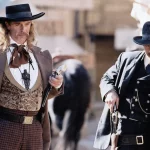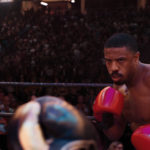
Kaepernick & America is a documentary film that tells the story of one of the most polarizing figures in American sports. A man who gave up his career and choose to be vilified and purposefully misunderstood, so that he could use his platform to give a voice to the oppressed and disenfranchised. The film spends time on Colin Kaepernick’s childhood, as a black boy adopted and raised by a white family in an overwhelmingly white community, and his early promise as an NFL quarterback, but the bulk of the 80-minute runtime is used to set the record straight about Kaepernick’s activism. The film does this through a series of interviews with Steve Wyche, Hue Jackson, Jim Harbaugh, Nate Boyer, Deray McKesson, and executive producer, Don Lemon, along with archived footage of media clips, interviews, and press conferences with Kaepernick himself. Kaepernick and America is unapologetically pro-Kaepernick, but also treats the opposing view with more fairness and clarity than the overwhelming majority of the media, and particularly the right-wing media, treated Kaepernick with during the 2016-2017 NFL season.
First things first, Kaepernick’s national anthem protest was never about protesting the American flag or our troops. The film makes this point crystal clear from the very beginning of its dive back into the Summer of 2016. That was the summer that Philando Castile was shot and killed, on video, during a routine traffic stop in which he informs the officer that he has a gun in the car. Castile was shot as he was reaching for his insurance and registration. Shortly afterward, Kaepernick starts sitting during the national anthem during 49ers preseason games. Nate Boyer’s interview is particularly poignant. Boyer was a former NFL long snapper, and Green Beret, who wrote an open letter to Kaepernick about his choice to sit during the national anthem. Boyer wrote about how he was initially critical of Kaepernick’s choice, but was willing to listen to what Kaepernick’s reasons were for protesting in the manner that he did, because the motto of the Green Beret’s is “de oppresso liber,” which means to free the oppressed. Boyer displayed exactly the kind of empathy and critical thinking that is so rare in our current digital age of polarization and outrage. Kaepernick’s response to Boyer’s open letter? Setting a meeting during which Kaepernick told Boyer that he has nothing but the utmost respect for him and everyone else who chooses to serve in the American military. Kaepernick then asked Boyer how he could still peacefully protest police brutality, without demeaning the sacrifices made by our nation’s servicemembers, and it was Boyer’s idea for Kaepernick to kneel instead of sit. Boyer’s rationale is that kneeling is a sign of respect within the military. Boyer kneels whenever he visits Arlington National Cemetery, out of respect for fallen soldiers, and players in the NFL kneel whenever someone is injured on the field. Boyer himself explained all of this on Colin Cowherd’s show on ESPN as this decision was made, and Kaepernick was very clear about how his protest was in no way meant to demean the American flag or our troops. There never should have been any misunderstanding about what and why exactly Kaepernick was protesting. So why was there?
Kaepernick and America thoroughly answers that question as well. As previously alluded to, the media, and particularly the right-wing media are criticized for the role they played in deliberately taking Kaepernick’s protest out of context. The media’s bias towards sensationalism and ratings are rightfully blamed, but the film does more than that. It lays the blame squarely at the feet of the majority of white Americans in this country who were primed to engage in white grievance politics. The 57% of white Americans who voted for Donald Trump are the same people who were choosing to misunderstand Kaepernick’s protest. Trump’s feud with Kaepernick is featured prominently in the film, but the film is clear in its view that Trump was merely taking advantage of the cancer that was always waiting to metastasize in 2016, and that cancer is white supremacy in America.
Kaepernick’s protest did not hurt anyone. It was thoughtful, and it was entirely peaceful, and he was still reviled, because to a specific portion of this country that was attracted to Donald Trump, there is no correct way to protest racial injustice. Steve Wyche and Deray McKesson do not mince any words on this point during their respective interviews in the film. Wyche details the racially motivated abuse hurled Kaepernick’s way, and the unjustified criticisms of his intelligence, despite the fact that Kaepernick graduated high school with a 4.0 GPA and scored higher on the famed Wonderlic test than Tom Brady, Peyton Manning, and Stanford-educated Andrew Luck. McKesson discusses the historical context of white grievance and white supremacy and the predictably violent nature of the response to Kaepernick’s peaceful protest. The film further illustrates this point by contrasting Kaepernick’s actions with footage of the Charlottesville protesters, and footage of Black Lives Matter activists being rammed into by vehicles. 90-95% of Black Lives Matter protests have been entirely peaceful, with no acts of violence, resistance to police, or property damage, but the movement is still criticized for their method of protest by the same people who objected to Kaepernick’s protest. Today, Martin Luther King is rightfully seen as an exemplar for peaceful protesters to emulate. There have been countless think pieces and arguments on cable news scolding the modern police reform movement to behave more like Martin Luther King if they want to achieve any real progress, but in his own time Martin Luther King was also criticized in the media for leading protests that were not as peaceful as he claimed.  The real source of anger for the people upset with Kaepernick is that he chose to take a stand and fight racial injustice, and accusing him of hating the flag or the troops, was just a convenient cover to make that hatred more acceptable.
The real source of anger for the people upset with Kaepernick is that he chose to take a stand and fight racial injustice, and accusing him of hating the flag or the troops, was just a convenient cover to make that hatred more acceptable.
The film ends on a somewhat optimistic note by highlighting how public opinion towards Kaepernick has improved significantly since the 2016-2017 NFL season after George Floyd’s Murder. Images of Derek Chauvin kneeling on George Floyd’s neck are juxtaposed with images of Kaepernick kneeling during the national anthem. The contrast is powerful and the film ends with the hope and promise of a better world partly because of the courage demonstrated by Kaepernick’s actions. Time will tell on if the filmmakers’ optimism is justified. Things at least appear to be looking up for Kaepernick himself with an NFL team, the Raiders, finally willing to give him the opportunity to workout for them.
Kaepernick and America covers several of the high-profile police killings of unarmed black men in America: Mike Brown and Eric Garner in 2014, Philando Castile, Alton Sterling, and Terence Crutcher in 2016, and George Floyd in 2020. When asked on 10/4/2016 to comment about the Terence Crutcher shooting in Tulsa, Kaepernick’s response was the following: “As a black male, and black people in those communities, they look at that as a message that okay they have the license to kill us, whenever they want, for whatever reason.” Betty Shelby, the officer who shot and killed Crutcher, was eventually found Not Guilty of First-Degree Manslaughter by a jury. Ever since Mike Brown’s death, The Washington Post has been keeping a police shootings database that keeps a running tally of how many Americans have been killed by the police in the past year. As of 6/2/2022, that number is 1,049. The names of most of those 1,049 won’t make national news. Nearly all of their killers won’t even stand trial, let alone be convicted by a jury. But I wanted to highlight one particular case involving a 17-year-old boy by the name of Christopher Jones, because as a public defender living in St. Louis his death hit close to home. Chris and a friend were found sleeping in a stolen vehicle by two St. Charles County police officers. Body cam footage shows Officer Michael Vegovisch approach the vehicle with his gun already drawn, first try to open the driver’s side door of the vehicle, then smash the driver’s side window with his gun, at which point Chris tries to speed away. Within seconds of Chris trying to drive away, Officer Vegovisch and his partner Michael Manzella fire at least 15 rounds at the car. Two bullets hit Chris, one in the back, and one in the head. He dies shortly after. The entire altercation is caught on video and lasted less than 20 seconds. Chris wasn’t threatening the officers, or pointing a firearm at them, or trying to hit them with the car, he was just trying to drive away. 8 years after Mike Brown was shot and killed, another St. Louis area black teenager was shot and killed by the police. Rather than bringing him in alive for being in a stolen vehicle, and then running from the police, officers instead decided to summarily execute him by firing at least 15 rounds in a suburban cul-de-sac, in broad daylight. And on April 30th, just 5 weeks ago, the St. Charles County Prosecutor’s Office declined to press charges against the two officers. This review is dedicated to Chris, and every other victim of police brutality, and their grieving families who have to suffer not only the loss of their brother, child, or grandchild, but also live the rest of their lives knowing that there won’t be any accountability for the loss of their loved one. That license to kill that Kaepernick was talking about still exists. In 2022, Racial injustice is The Problem We All (Still) Live With. Colin Kaepernick gave up his career for the radical idea that police officers who kill people of color should actually be held accountable for their crimes, and not put on paid administrative leave. And it’s Kaepernick’s willingness to make that sacrifice, just for the hopes of a better world, with no guarantees, that makes him an American Hero.

Kaepernick & America premiered at the Tribeca Film Festival on Thursday, June 9.















